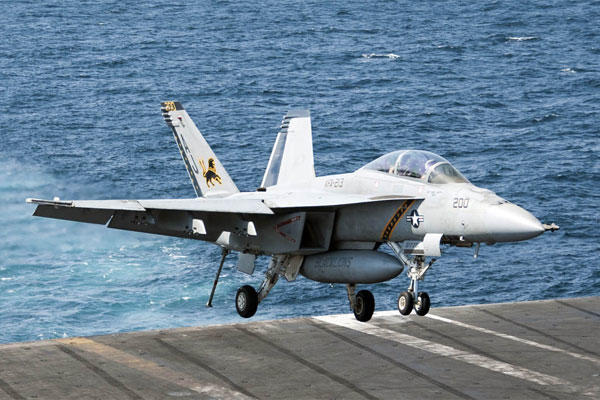The Pentagon announced Wednesday the U.S. has named the air campaign in Iraq and Syria as "Operation Inherent Resolve" -- the same name which reportedly was rejected a few weeks ago by top commanders.
The name will be retroactive to actions against the Islamic State in Iraq and Syria (ISIS) extremists in the region going back to Aug. 8, when airstrikes began, said Rear Adm. John Kirby, the Pentagon press secretary.
Earlier this month, the Wall St. Journal reported that the name "Inherent Resolve" had been proposed but was rejected by top commanders for being, as one officer was quoted as saying anonymously, too "bleh."
In a statement, the U.S. Central Command said that "the name Inherent Resolve is intended to reflect the unwavering resolve and deep commitment of the U.S. and partner nations in the region and around the globe to eliminate the terrorist group ISIL (another acronym for the Islamic State.)"
"It also symbolizes the willingness and dedication of coalition members to work closely with our friends in the region and apply all available dimensions of national power necessary -- diplomatic, informational, military, economic -- to degrade and ultimately destroy ISIL," the statement said.
At a later Pentagon briefing, Kirby said the name had been discussed with coalition partners before being approved. He said the name was meant to convey that "we are going to stay resolved and determined to get after this threat and we’re going to do it in partnership" with allies.
Giving names to military operations has been a tradition for the Pentagon dating back to World War II, when the U.S. picked up the practice from the British and Prime Minister Winston Churchill, who personally approved operational names and frequently chose them himself.
The Afghanistan war has been called Operation Enduring Freedom from the onset and the Iraq was called Operation Iraqi Freedom before being changed to Operation New Dawn in August 2010 as U.S. troops began to withdraw.
The naming of the operation came as U.S. warplanes stepped up airstrikes in and around the northern Syrian town of Kobani, where Kurdish militias were holding out against IS fighters.
CentCom said that 18 airstrikes were carried out Tuesday and Wednesday around Kobani. Kirby said the reason for the increased airstrikes was that there were more targets to hit as IS moved up re-inforcements in an effort to take the town.
In recent days, "we believe we have killed several hundred ISIL fighters in and around Kobani," Kirby said. "Kobani could still fall, it could very well fall," Kirby said, but "we believe it’s being defended. Our assessment today is that the Kurdish militia still hold it."
-- Richard Sisk can be reached at richard.sisk@monster.com





























